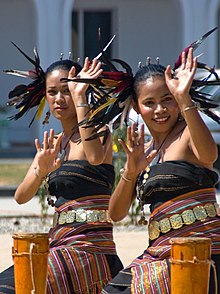Women in East Timor
You can help expand this article with text translated from the corresponding article in German. (December 2019) Click [show] for important translation instructions.
|
 A pair of East Timorese women performing a traditional dance. | |
| General Statistics | |
|---|---|
| Maternal mortality (per 100,000) | 300 |
| Women in parliament | 38.5% (2012) |
| Women in labour force | 38.4% (2011) |
| Gender Inequality Index | |
| Value | NR |
| Rank | NR |
| Global Gender Gap Index[1] | |
| Value | 0.638 (2018) |
| Rank | 124th |
| Part of a series on |
| Women in society |
|---|
 |
Among the traditional practices challenging the status of women in East Timor or women in Timor-Leste include not being able to inherit or own property[2] and the cultural notion that women normally belong to the home.[3]
Apart from these customary concepts, East Timorese women also confront domestic violence. Rape cases and sexual slavery were allegedly committed by East Timorese pro-integration militias during the September 1999 crisis in East Timor.[2] One of the organizations that promote empowerment and foster gender equality for the women of East Timor is the United Nations Development Fund for Women (UNIFEM).[3] In 2010, a law was passed making domestic violence a public crime, but the practice remained prevalent nevertheless. In a 2009–10 Demographic and Health Survey, 36% of married women reported having experienced physical, psychological or sexual violence from their husband or partner, but only 24% reported discussing this with anyone and only 4% reported seeking help from the police.[4] According to the same survey, 71% of men believe that the wife's neglecting children justifies the husband's beating her, while 72% of women believe that a husband is justified in beating his wife if she goes out without informing him.[5] According to activists in non-governmental organizations such as Asisténsia Legál ba Feto no Labarik, domestic violence is severely under-reported and the punishments are not deterrent: in one case, a man who "stabbed his wife in the back of the head and struck her repeatedly with a block of wood, after an argument about feeding their children" only received a suspended jail sentence of seven months.[6]
Sex trafficking
Citizen and foreign women and girls have been victims of sex trafficking in East Timor.[7][8] They are raped and physically and psychologically harmed in brothels, hotels, homes, and other locations throughout the country.[9]
See also
References
- ^ "The Global Gender Gap Report 2018" (PDF). World Economic Forum. pp. 10–11.
- ^ a b Women's Situation, East Timor
- ^ a b Crook, Matt. Women Learn the Political Ropes, Rights-East Timor
- ^ "BREAKING THE CYCLE OF DOMESTIC VIOLENCE IN TIMOR- LESTE" (PDF). UNDP. Retrieved 20 July 2016.
- ^ "Timor-Leste strives to overcome culture of domestic violence". The Guardian. Retrieved 20 July 2016.
- ^ "Domestic violence laws in East Timor failing to protect women, perpetrators often unpunished, NGOs say". ABC. Retrieved 20 July 2016.
- ^ "2019 Trafficking in Persons Report: Timor-Leste". U.S. Department of State. 2019.
- ^ "10 FACTS ABOUT HUMAN TRAFFICKING IN TIMOR-LESTE" (PDF). IOM. 2018.
- ^ "Putting a Face on Pain: Innovative Training to Fight Trafficking in Timor Leste". International Organization for Migration. July 19, 2016.
Further reading
- Martins da Silva, Mira and Susan Kendall. Issues for Women in East Timor: The Aftermath of Indonesian Occupation, February 18–22, 2002, University of Sydney, Australia
- Violence against Women in Melanesia and East Timor: A Review of International Lessons, Office of Development Effectiveness, AusAID, Australian Government, 32 pages
External links
- Status of Women in East Timor, AusAIDvideo, September 7, 2009

